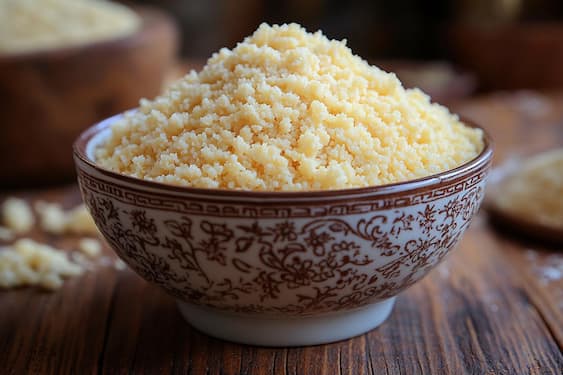10 Amazing Benefits Of Suji For Your Health
Suji, also known as semolina, is a coarse, pale yellow flour made from durum wheat, specifically the endosperm of the wheat grain. It has a slightly granular texture and is often used in various culinary applications.

Suji, or semolina, is a popular ingredient made from durum wheat that offers several health benefits, thanks to its nutritional profile and versatility. Here's a detailed look at its benefits:
1. Rich in Nutrients
Suji is packed with essential nutrients including iron, magnesium, and B vitamins such as folate, thiamine, and riboflavin. Iron is crucial for preventing anemia and ensuring proper oxygen transport in the blood. Magnesium supports bone health, muscle function, and energy production, while B vitamins are vital for metabolic processes and overall vitality.
2. High in Protein
Suji contains a moderate amount of protein compared to other grains, which is essential for muscle growth, repair, and overall cellular function. Protein is also important for the synthesis of hormones and enzymes in the body.
3. Good Source of Fiber
Suji provides dietary fiber, which promotes digestive health by aiding in regular bowel movements and preventing constipation. Fiber also helps in maintaining a feeling of fullness, which can assist in weight management by reducing overall calorie intake.
4. Supports Digestive Health
The fiber content in suji not only aids digestion but also helps in maintaining a healthy gut microbiome. This can improve nutrient absorption and overall digestive comfort, reducing the risk of digestive disorders.
5. Low Glycemic Index
Suji has a lower glycemic index (GI) compared to refined flours, meaning it causes a slower, more gradual increase in blood sugar levels. This makes it a better option for individuals managing diabetes or insulin resistance, as it helps in maintaining stable blood glucose levels.
6. Energy Boosting
The complex carbohydrates in suji provide a steady release of energy, which can help in maintaining stamina and preventing energy crashes. This makes it a good choice for sustaining energy levels throughout the day.
7. Versatile Usage
Suji is incredibly versatile and can be used in a wide range of dishes, from savory preparations like upma and khichdi to sweet treats like halwa and pudding. Its adaptability in cooking allows it to be incorporated into various meals and diets.
8. Supports Heart Health
The magnesium and fiber in suji contribute to cardiovascular health. Magnesium helps regulate blood pressure and supports heart function, while fiber can help lower cholesterol levels, reducing the risk of heart disease.
9. Improves Skin Health
The B vitamins and minerals in suji play a role in maintaining healthy skin. Vitamin B2 (riboflavin) supports skin repair and regeneration, while zinc aids in reducing inflammation and promoting a healthy complexion.
10. Helps in Weight Management
The fiber content in suji helps in keeping you full for longer periods, which can assist in controlling appetite and managing weight. Its complex carbohydrates also provide sustained energy, reducing the likelihood of frequent snacking.
Overall, suji is a nutritious and versatile ingredient that supports various aspects of health, from digestive wellness to cardiovascular function, making it a valuable addition to a balanced diet.
